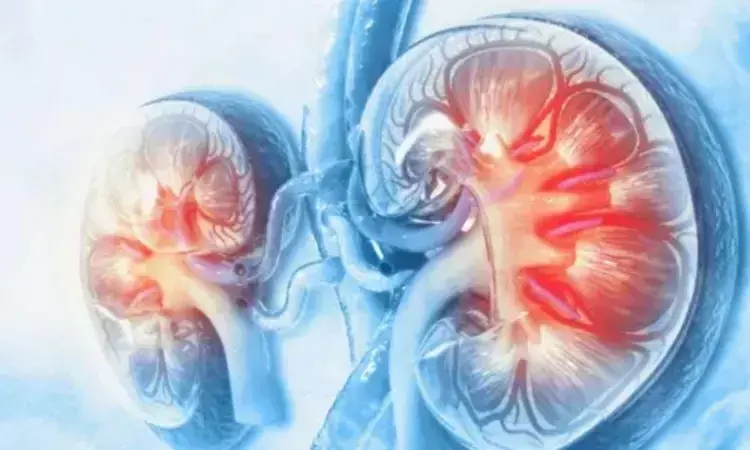- Home
- Medical news & Guidelines
- Anesthesiology
- Cardiology and CTVS
- Critical Care
- Dentistry
- Dermatology
- Diabetes and Endocrinology
- ENT
- Gastroenterology
- Medicine
- Nephrology
- Neurology
- Obstretics-Gynaecology
- Oncology
- Ophthalmology
- Orthopaedics
- Pediatrics-Neonatology
- Psychiatry
- Pulmonology
- Radiology
- Surgery
- Urology
- Laboratory Medicine
- Diet
- Nursing
- Paramedical
- Physiotherapy
- Health news
- Fact Check
- Bone Health Fact Check
- Brain Health Fact Check
- Cancer Related Fact Check
- Child Care Fact Check
- Dental and oral health fact check
- Diabetes and metabolic health fact check
- Diet and Nutrition Fact Check
- Eye and ENT Care Fact Check
- Fitness fact check
- Gut health fact check
- Heart health fact check
- Kidney health fact check
- Medical education fact check
- Men's health fact check
- Respiratory fact check
- Skin and hair care fact check
- Vaccine and Immunization fact check
- Women's health fact check
- AYUSH
- State News
- Andaman and Nicobar Islands
- Andhra Pradesh
- Arunachal Pradesh
- Assam
- Bihar
- Chandigarh
- Chattisgarh
- Dadra and Nagar Haveli
- Daman and Diu
- Delhi
- Goa
- Gujarat
- Haryana
- Himachal Pradesh
- Jammu & Kashmir
- Jharkhand
- Karnataka
- Kerala
- Ladakh
- Lakshadweep
- Madhya Pradesh
- Maharashtra
- Manipur
- Meghalaya
- Mizoram
- Nagaland
- Odisha
- Puducherry
- Punjab
- Rajasthan
- Sikkim
- Tamil Nadu
- Telangana
- Tripura
- Uttar Pradesh
- Uttrakhand
- West Bengal
- Medical Education
- Industry
Bromadiolone-Induced Severe Acute Kidney Injury reversed by Vitamin K1 administration: Case Report

China: A recent case report highlights a concerning link between bromadiolone, a potent anticoagulant commonly used as a rodenticide, and severe acute kidney injury (AKI) resulting from significant coagulation disturbances. The case, published in BMC Nephrology, unveiled the importance of recognizing and addressing the potential renal complications associated with bromadiolone exposure.
"Bromadiolone can trigger AKI by causing a severe and prolonged coagulation disorder. However, kidney function may be rapidly restored within days with high-dose vitamin K1 treatment," the researchers stated.
Poison control centers in the United States handle approximately 2.3 million reports of human poisonings each year, with rodenticides responsible for about 0.5% of these cases. Rodenticides encompass a range of substances, including long-acting "superwarfarin" anticoagulants, warfarin, and phosphides, with anticoagulant rodenticides being the most prevalent. Bromadiolone, a commonly used long-acting anticoagulant rodenticide, is known for causing severe coagulation dysfunction. However, there have been no comprehensive reports detailing AKI resulting from bromadiolone poisoning to date.
Buyun Wu, The First Affiliated Hospital of Nanjing Medical University, Nanjing, China, and colleagues described a case of a 27-year-old woman admitted to the hospital with severe coagulopathy and acute kidney injury.
Her coagulation tests revealed a prothrombin time exceeding 120 seconds and an international normalized ratio (INR) greater than 10. Further evaluation of coagulation factors showed markedly reduced levels of factors II, VII, IX, and X, indicating a vitamin K deficiency. The AKI was non-oliguric and accompanied by gross dysmorphic hematuria. The patient's serum creatinine level rose significantly from 0.86 to 6.96 mg/dL. A plasma bromadiolone concentration of 117 ng/mL was detected using gas chromatography/mass spectrometry, suspecting anticoagulant rodenticide poisoning. All other potential causes of AKI were ruled out, except for a horseshoe kidney.
Following the correction of the coagulopathy with high doses of vitamin K and plasma transfusion, the patient's kidney function fully recovered. At a follow-up 160 days post-discharge, coagulation function had normalized, and serum creatinine had decreased to 0.51 mg/dL.
The case indicates that bromadiolone can lead to acute kidney injury (AKI) due to a severe and prolonged coagulation disorder. Unlike other anticoagulant-related nephropathies, kidney function may recover swiftly within days following treatment with a large dose of vitamin K1.
"These findings are significant for clinicians handling coagulopathy in critical care settings. Recognizing the connection between severe coagulation disturbances and AKI could facilitate earlier identification, monitoring, and intervention, ultimately improving patient outcomes. Routine renal function monitoring and prompt correction of coagulation abnormalities should be essential practices in managing patients at risk for AKI," the researchers concluded.
Reference:
Wang, H., Deng, L., Sun, B. et al. Bromadiolone may cause severe acute kidney injury through severe disorder of coagulation: a case report. BMC Nephrol 25, 303 (2024). https://doi.org/10.1186/s12882-024-03746-0
Dr Kamal Kant Kohli-MBBS, DTCD- a chest specialist with more than 30 years of practice and a flair for writing clinical articles, Dr Kamal Kant Kohli joined Medical Dialogues as a Chief Editor of Medical News. Besides writing articles, as an editor, he proofreads and verifies all the medical content published on Medical Dialogues including those coming from journals, studies,medical conferences,guidelines etc. Email: drkohli@medicaldialogues.in. Contact no. 011-43720751


